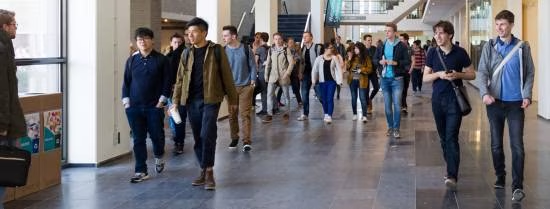During her college days, Sophie Schmeets struggled with depression. This inspired her to found Maskerclass after her studies. With it, the EUR alumnus helps organisations deal with mental (un)health. There are also steps to take at the university. "If you're not comfortable as a student, the threshold to ask for help often becomes higher", she says.
Sophie began studying econometrics at Erasmus University Rotterdam in 2011. It was not entirely her own choice. Her mother and sister helped, "I didn't know what I wanted. I did econometrics more because I could. Not because I loved it. During my master's I began to suffer more and more from somberness. That was the moment I really started thinking: what do I really want for myself?"
Maskerclass: minor adjustments, major impact
Now Sophie is doing something that suits her completely: she has her own company Maskerclass. She helps companies and organisations to put mental health better on the agenda. She teaches executives how to make themselves vulnerable while leading effectively. "Many executives want this, but don't know exactly how. That's where we help", Sophie says.
Sophie points out that even small adjustments can have a big impact on social safety within an organisation. For example, a company in Rotterdam that was struggling with a lot of staff drop-outs knocked on her door. "They had a beautiful office. Very modern and all made of glass. They also did their HR interviews there. I wouldn't want to have a sensitive conversation there. Everyone could watch into that room. It was like a fishbowl. Employees can now request a conversation in a different place and there are curtains so it can be closed. So small changes can make a big impact."

"Many executives want this, but don't know exactly how. That's where we help"
Sophie Schmeets
Lack of guidance during college years
During her college years, Sophie suffered from depression. She missed a point of contact at university to talk about this. From that, Maskerclass was born. "I didn't know where to turn. The university is not a healthcare institution, but it does have a certain responsibility to its students. We know that people in the student age group often encounter mental health issues for the first time. Then it is good to prepare students for that. Teach them skills to deal with it, such as starting a conversation about mental health, and learning to take care of themselves and each other. These are skills that will be useful for the rest of your life."

"I didn't know where to turn. The university is not a healthcare institution, but it does have a certain responsibility to its students."
Sophie Schmeets
Role of our university: good steps forward
In recent years, there has been much more attention to student well-being. Sophie is happy about that, but there is still room for improvement: "Erasmus University Rotterdam has a great platform for student mental health, there is a well-being week, and you can talk to student psychologists. That's great. But it's important that all students know it's there. And that they are encouraged to use it. If you're feeling down, it's a bigger step to ask for help. Also, you may not have the concentration or energy during such a dip to find appropriate help. That is when you need extra encouragement."
According to Sophie, Erasmus School of Economics (ESE) is good at this. They called Sophie for help. In response, ESE threw their mentorship on the rocks. A third of the time is now devoted to mental health. That used to be zero hours. Sophie was allowed to fill that in this block and train the mentors. "That's a structural solution. Because at the start of everyone's student life, you immediately invest on the relevant skills and knowledge. You learn to have conversations and how to be there for each other. That's so valuable. You get something out of that all your life."
Three tips from Sophie
- Check yourself! Every day, take 5 minutes to reflect about how you are doing and whether you are doing the things you really want to do. You can do this, for example, by sitting in silence or writing half an A4 sheet full of your thoughts.
- Remember that your studies do not determine your life. Sophie studied econometrics but now helps companies deal with mental health. You can do whatever you want.
- If you do not yet know exactly what you really like to do, start working four days after your studies. You can devote the fifth day to yourself. Do a training course, volunteer work or something completely different. That has brought Sophie a lot.
Give yourself some time!
Sophie stresses that making your own choices is very important, even if they are not the most logical career moves. She therefore advises students to try many different things to discover what they like.
Next year she will begin a new study in professional communications herself. This time, a choice she made all by herself. Sophie says with a smile, "This is the first time I do know what I like. I'm really going to do this study for myself."
- More information
Would you like to attend an event of Sophie's? Come to the Lifelong Learning Festival! Sophie will give a lecture there in Dutch.
Or
Check out all city talks during the Lifelong Learning Festival- Related content

